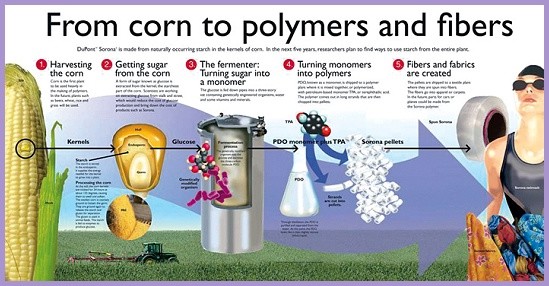Today, most chemical products are made from oil, gas and coal. However, DuPont, one of the largest chemical companies in the U.S., has been working diligently to create chemical products that are plant-based. DuPont and its partner Tate & Lyle jointly developed a proprietary fermentation process that produces 1,3-propanediol (Bio-PDO™) using corn instead of a petroleum-based feedstock. They made their first commercial shipments of Bio-PDO™ in November 2006 from their Loudon, Tennessee facility.
According to the president of the DuPont Tate & Lyle joint venture, Steven Mirshak, “Bio-PDO™ is a versatile ingredient for a number of products including specialty polymers such as Sorona®, and also is well suited for cosmetics, liquid detergents and industrial applications like anti-freeze.” The bio-based production of Bio-PDO™ consumes 40 percent less energy and reduces greenhouse gas emissions by 20 percent versus petroleum-based propanediol. Production of 100 million pounds of Bio-PDO™ will save the energy equivalent of 10 million gallons of gasoline per year, or enough to fuel 22,000 cars annually.
According to a New York Times article, DuPont is also working with the U.S. Energy Department to turn corn plants into vehicular fuel and is close to developing plant-based hair dyes and nail polishes that will not adhere to skin. Currently, DuPont already makes 17
percent of its revenues from nondepletable resources and its chief
executive expects to increase that to nearly $8 billion by 2015. Overall,
DuPont has allocated nearly 10 percent of its $1.4 billion research
budget to extract ingredients from carbohydrates – things that
grow and can be infinitely replaced instead of from materials that
are mined or drilled and readily depleted. * The updated numbers were provided by DuPont in March, 2007. For more information, please
see:
| |||||||||||||

